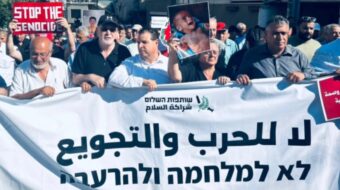March 19 will mark the 4th anniversary of the war in Iraq. This anniversary comes at a turning point for the peace movement. There is now a solid majority of the American public that wants Congress to end the war and bring the troops home. With the pressure and momentum created by the election results of 2006 and the historic 500,000-person march in D.C. on Jan. 27, Congress is starting to take action.
A lot of political space has opened up because of the results of the ’06 election. The peace movement has put a new emphasis on Congress and young people are pressuring Congress to act. While the Republicans controlled Congress, they did nothing more than rubber-stamp the Bush Administration’s plans for the war. However, now, with the Democratically-controlled Congress, the peace movement has the ability to influence and push newly elected officials to keep their promises to end the war.
Congress has the power to end the war through a number of different ways. Congress is able to set a time table for troop withdrawal through legislation. Congress can also act to cut the funds for the war by not supporting Bush’s Emergency Supplemental funding requests or by placing amendments on the request to specify that the funds cannot be used to build permanent military bases and only used to bring the troops home. At the beginning of this Congress, there were numerous bills introduced that dealt with these issues. The most comprehensive of these is H.R. 508 the “Bring The Troops Home and Iraq Sovereignty Act of 2007” introduced by Rep. Lynne Woolsey (D-Calif.), Rep. Maxine Waters (D-Calif.) and Rep. Barbara Lee (D-Calif.) who are members of the Out of Iraq Caucus in the House.
Feeling the pressure from the people, the Democrats in the House and Senate have tried to take action. The House was able to pass a nonbinding resolution expressing disapproval of Bush’s plans for a troop escalation. It is important to note that only two Democrats voted against it and 11 Republicans voted for it.
The House has already passed other pieces of legislation that will make huge impacts on the daily lives of youth and working people The House passed the Employees Free Choice Act (EFCA) that would make it easier for unions to organize and a no-strings attached raise to the minimum wage was also passed. But both of these face strong opposition in the Senate from Republicans that have only a one-vote minority.
The passage of the nonbinding resolution was a step in the right direction. Until now, there has not been one piece of legislation, binding or nonbinding, passed in the either the House or the Senate expressing the people’s opposition and disapproval of the war; and before the House’s non-binding resolution no debate on the war and occupation of Iraq had occurred since its start.
To continue to pressure Congress into action, youth and students need to continue to be in the streets, at the ballot box and in the halls of Congress. On the 4th Anniversary, the National Youth and Student Peace Coalition (NYSPC) will be joining the millions of other peace and justice activists in calling on Congress to act to end the war. The National Youth and Student Peace Coalition is calling on all youth to wear their opposition to the war on their sleeves by wearing our “Books Not Bombs” button on March 19th to show and build opposition in their communities. NYSPC has also sent buttons to every member of Congress and ask that youth and students call and lobby their representatives to wear the button and act to fund books, not bombs.
As the 5th year of the war in Iraq begins, the peace movement must continue to reach out and broaden the movement to end the war. The peace movement alone won’t be able to end the war. It will take everyone being involved, lobbying their elected officials at all levels of government, building community involvement and opposition and to be in the streets demanding an end to the war. With sustained and united actions, we can ensure that this will be the last anniversary of the invasion of Iraq. Young people were organizing against this war before it started and will continue to organize until it ends; youth will not be silent in the face of this great injustice and violence.
Adam Tenney is a member of the Coordinating Committee of the National Youth and Student Peace Coalition (NYSPC). For more information on how to get involved with NYSPC, visit us at .









